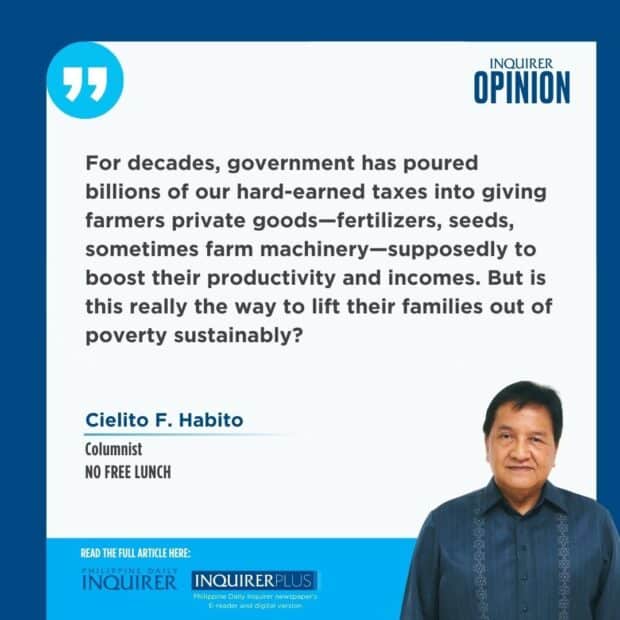
Mang Toto, a Bicolano rice farmer in his 60s, had seen it all—typhoons, droughts, fluctuating rice prices, and promises from every new administration to uplift their lives. He recalled how in one campaign season, he received sacks of free fertilizer and some seeds from the government. But when the excitement had died down, so did the promises. The fertilizers were quickly used up, the seeds planted, and Mang Toto was back where he began—left to contend with the unpredictability of farming with little more than his farm implements and a prayer.
Mang Toto is just one of millions with the same story to tell. For decades, government has poured billions of our hard-earned taxes into giving farmers private goods—fertilizers, seeds, sometimes farm machinery—supposedly to boost their productivity and incomes. But is this really the way to lift their families out of poverty sustainably? There’s one important principle I learned from my University of the Philippines Los Baños mentors as an agricultural economics undergraduate in the early ’70s, and on to my Harvard professors in my doctoral studies in the early ’80s: taxpayer money to help the poor, especially small farmers, is best spent on public goods, not private goods. Its benefits will be more widespread, lasting, and equitable.
Two qualities mark private goods: they are excludable and rival. Excludable means that a sack of fertilizer sold (or given) to Mang Toto is his alone; rival means that other farmers cannot benefit from the same fertilizer he has used. In contrast, a public good like a streetlamp cannot exclude anyone from its light, and allow its use to be limited only to those who would pay for it (non-excludable). And all can equally enjoy the benefit of the lamp’s light without depriving others of it (non-rival). It falls on government to provide essential public goods as no private investor would, because once in place, no one can be forced to pay for it to recover costs. Anyone can, and will, just get a “free ride.”
In Isabela province, farmers struggled with inconsistent water supply for years, relying on rain-fed agriculture that left them vulnerable to drought. When the government invested in a large-scale irrigation system, the impact was immediate and far-reaching. Suddenly, farmers could plant multiple crops per year, significantly increasing their yields and incomes—not just for one cropping season, but for generations of farmers to come.
When government focuses on private goods, it addresses symptoms, not root causes. Fertilizers boost yields, but amount to nothing if lack of irrigation and drainage systems makes farming vulnerable to both droughts and floods. Seeds raise production, but won’t matter if roads to the markets are impassable in wet season. Too often, fertilizers and seeds given are not even the right ones needed. Machinery improves farm efficiency, but won’t help if the harvest spoils for lack of dryers or cold storage. Public goods, being non-excludable and non-rival, benefit everyone, and one farmer’s use of a communal irrigation system, farm-to-market road, or post-harvest facility doesn’t deprive others of its use. Public goods benefit all and not just a select few lucky enough to receive government handouts. The sad reality is that studies have consistently shown fertilizers and hybrid seeds distributed by government to have benefited the more capable and better-off farmers, and less those in most need.
Knowledge is an often-overlooked public good. Research and extension services to give farmers access to the latest farming techniques, technologies, and market information, are a powerful tool to improve productivity, but are often underfunded or nonexistent. In Guinayangan, Quezon, coconut farmers struggled for years with low yields, frequent typhoon damage, and declining incomes. But when the International Institute for Rural Reconstruction partnered with the local government and the Department of Agriculture to train them on intercropping, they learned to grow high-value crops like cassava, cacao, coffee, pineapples, potato, and peanut alongside the coconut trees. This simple change greatly boosted their incomes and improved their farms’ sustainability. Their new knowledge was a public good that benefited not just individual farmers, but spread throughout the community, lifting many out of poverty.
Focusing on public goods helps farmers not only efficiently, but also equitably. With private goods, some farmers are inevitably left out due to bureaucratic inefficiencies, corruption, and the sheer scale of the farming sector. But public goods by nature are available to all, and their benefits go well beyond one cropping season. Rather than focus on private goods that help individual farmers for one crop, taxpayer money is better spent on public goods that benefit the entire agricultural sector over the long haul.
cielito.habito@gmail.com